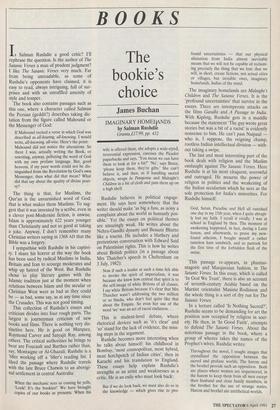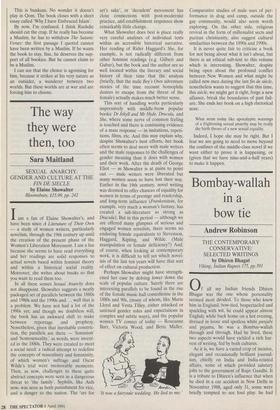BOOKS
The bookie's choice
James Buchan
IMAGINARY HOMELANDS by Salman Rushdi Granta,f17.99, pp. 432 Is Salman Rushdie a good critic? I'll rephrase the question. Is the author of The Satanic Verses a man of prudent judgment? I like The Satanic Verses very much. Far from being unreadable, as some of Rushdie's opponents have claimed, it is easy to read, always intriguing, full of sur- prises and with an unruffled amenity of style and temper.
The book also contains passages such as this one, where a character called Salman the Persian (geddit?) describes taking dic- tation from the figure called Mahound or the Messenger of God:
If Mahound recited a verse in which God was described as all-hearing, all-knowing I would write, all-knowing all-wise. Here's the point: Mahound did not notice the alterations. So there I was, actually writing the Book, or rewriting, anyway, polluting the word of God with my own profane language. But, good heavens, if my poor words could not be dis- tinguished from the Revelation by God's own Messenger, then what did that mean? What did that say about the quality of divine poet- ry?
The thing is that, for Muslims, the Qur'an is the unvarnished word of God: that is what makes them Muslims. To sug- gest that it was invented by a scribe, even in a clever post-Modernist fiction, is unwise. Islam is approximately 622 years younger than Christianity and not so good at taking a joke. Anyway, I don't remember many Christian writers saying in 1368 AD that the Bible was a forgery.
I sympathise with Rushdie in his captivi- ty. I share his horror at the way the book has been used by radical Muslims in India, Britain and Iran to scourge moderates and whip up hatred of the West. But Rushdie chose to play literary games with the Islamic tradition just at the moment when relations between Islam and the secular or Christian West were as bad as they could be — as bad, some say, as at any time since the Crusades. This was not good timing.
This collection of Rushdie's essays and criticism divides into four rough parts. The largest is journeyman criticism of new books and films. There is nothing very dis- tinctive here. He is good on Marquez, Raymond Carver and Satyajit Ray, among others. The critical authorities he brings to bear are Foucault and Barthes rather than, say, Montaigne or Al-Ghazali: Rushdie is a 68er working off a '68er's reading list. I liked the passage where Rushdie travels with the late Bruce Chatwin to an aborigi- nal settlement in central Australia:
When the mechanic sees us coming he yells, 'Look! It's the bookies!' We have brought copies of our books as presents. When his
wife is offered these, she adopts a wide-eyed, reverential expression, caresses the Picador paperbacks and says, 'You mean we can have them to look at for a bit?"No', says Bruce, 'please keep them, they're gifts.' She can't believe it, and then, as if handling sacred objects, wraps In Patagonia and Midnight's Children in a bit of cloth and puts them up on a high shelf.
Rushdie believes in political engage- ment. He says here somewhere that the writer should make 'as big a fuss, as noisy a complaint about the world as humanly pos- sible.' Yet the essays on political themes are amazingly weak. He writes about the Nehru-Gandhi dynasty and Benazir Bhutto like a tourist. He includes a blathery and pretentious conversation with Edward Said on Palestinian rights. This is how he writes about British politics (in a passage about Mrs Thatcher's speech in Cheltenham on 3 July, 1982):
Now if such a leader at such a time felt able to invoke the spirit of imperialism, it was because she knew how .central that spirit is to the self-image of white Britons of all classes. I say white Britons because it's clear that Mrs Thatcher wasn't addressing the two million or so blacks, who don't feel quite like that about the Empire. So even her use of the word 'we' was an act of racial exclusion. ..
This is student-level debate, where rhetorical devices such as 'it's clear' and 'so' stand for the lack of evidence, the miss- ing steps in the argument. Rushdie becomes more interesting when he talks about himself: his childhood in Bombay, 'most cosmopolitan, most hybrid, most hotchpotch of Indian cities', then in Karachi and his translation to England. These essays help explain Rushdie's strengths as an artist and weaknesses as a critic. He is an exile who must look back:
But if we do look back, we must also do so in the knowledge — which gives rise to pro- found uncertainties — that our physical alienation from India almost inevitably means that we will not be capable of reclaim- ing precisely the thing that we lost; that we will, in short, create fictions, not actual cities or villages, but invisible ones, imaginary homelands, Indias of the mind.
The imaginary homelands are Midnight's Children and The Satanic Verses. It is the `profound uncertainties' that survive in the essays. There are intemperate attacks on the films Gandhi and A Passage to India. With Kipling, Rushdie gets in a muddle because the statement The guy wrote great stories but was a bit of a racist' is evidently nonsense to him. He can't pass Naipaul who is, I suppose, the reigning champ, rootless Indian intellectual division — with- out taking a swipe.
The last and most interesting part of the book deals with religion and the Muslim onslaught against The Satanic Verses. Here Rushdie is at his most eloquent, sorrowful and outraged. He mourns the power of religion in politics and the weakening of the Indian secularism which he sees as the sole protection for India's minorities. For Rushdie himself:
God, Satan, Paradise and Hell all vanished one day in my 15th year, when I quite abrupt- ly lost my faith. I recall it vividly. I was at school in England by then. The moment of awakening happened, in fact, during a Latin lesson, and afterwards, to prove my new- found atheism, I bought myself a rather tasteless ham sandwich, and so partook for the first time of the forbidden flesh of the swine.
This passage re-appears, in phantas- magoric and Marquesian fashion, in The Satanic Verses. In this essay, which is called 'In God We Trust', there is also an account of seventh-century Arabia based on the Marxist orientalist Maxime Rodinson and the whole thing is a sort of dry run for The Satanic Verses.
In a lecture called 'Is Nothing Sacred?', Rushdie seems to be demanding for art the position now occupied by religion in soci- ety. He then, in 'In Good Faith', attempts to defend The Satanic Verses. About the notorious passage in the book, where a group of whores takes the names of the Prophet's wives, Rushdie writes:
Throughout the novel, I sought images that crystallised the opposition between the sacred and profane worlds. The harem and the brothel provide such an opposition. Both are places where women are sequestered, in the harem to keep them from all men except their husband and close family members, in the brothel for the use of strange males. Harem and brothel are antithetical worlds.
This is bunkum. No wonder it doesn't play in Qom. The book closes with a short essay called 'Why I have Embraced Islam'.
By now, I'm confused. I think Rushdie should cut the crap. If he really has become a Muslim, he has to withdraw The Satanic Verses: the first passage I quoted cannot have been written by a Muslim. If he wants the book to stay, fine, he deserves the sup- port of all bookies. But he cannot claim to be a Muslim.
I can see that the choice is agonising for him, because it strikes at his very nature as an outsider, a wanderer between two worlds. But these worlds are at war and are forcing him to choose.



















































 Previous page
Previous page